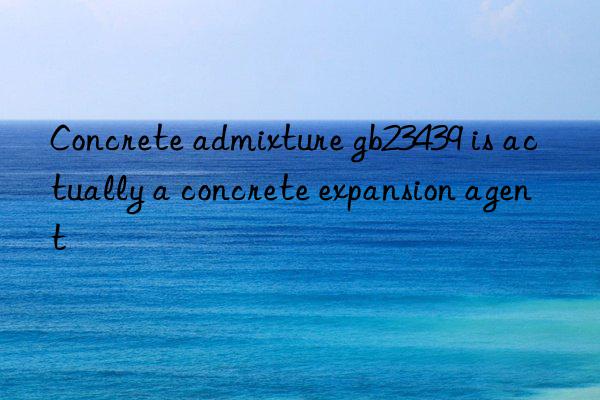
Customers often ask what concrete admixture gb23439 is. In fact, it is a type of concrete admixture, an expansion agent. The editor below will give you a brief introduction to the performance and function of the concrete admixture gb23439 expansion agent.
GB 23439-2009 "Concrete Expansion Agent" National Standard
Concrete expansion agent is my The company produces a low-alkali, low-dosage high-performance concrete expansion agent. It is also a calcium sulfoaluminate concrete expansion agent, but its performance is more stable and the particle gradation is more reasonable. The development of its expansion performance is similar to that after the re-labeling. The cement hydration system is more suitable. Adding an expansion agent with an amount of 8 to 10% of cement in the concrete can compensate for the shrinkage of the concrete and improve the concrete's ability to resist cracking and seepage, making it an impermeable and waterproof concrete with excellent performance.
Main uses:
Prepare shrinkage-compensating, joint-filling concrete for crack resistance Impermeable, structural self-waterproofing, pool and rigid waterproof roofing projects; self-stressing concrete prepared for cement products.
Mechanism of action:
Concrete expansion agent is an ideal material to compensate for shrinkage. Temperature difference shrinkage is the main reason. When added to concrete, a large amount of expansile crystal hydrates are generated after mixing with water, causing moderate expansion. Under the constraints of steel bars and adjacent positions, the expansion energy generated is converted into compressive stress. This stress can offset the hardening of concrete. shrinkage and tensile stress, thereby reducing cracks. The anti-penetration agent mainly improves its density and water-increasing properties to meet its impermeability and impermeability. However, due to the shrinkage of concrete, the stress caused by shrinkage is enough to cause deformation of the structure and even cracks. Due to cracking, concrete waterproofing loses a fundamental line of defense. This is the main cause of leaks in buildings. Crystals continue to fill the pores, making the interior of the concrete dense, improving the concrete's ability to resist seepage, acid, alkali, chemical erosion, and micro-expansion. This agent can achieve various indicators of expansion agents and waterproofing agents. A concrete admixture with dual effects of expansion in the plastic phase and expansion in the hardening phase, which fully compensates for the shrinkage of concrete. It has a small dosage and has the composite functions of expansion, water reduction, anti-seepage, and anti-cracking. It is mixed into concrete or mortar in a certain proportion and can produce expansion stress under restricted conditions, thereby compensating shrinkage, preventing cracks in concrete, and improving the impermeability of concrete. It can replace cement in equal amounts without any adverse effects on the bonding strength of steel bars and has no corrosion effect on steel bars.
Usage:
The dosage of concrete expansion agent is 10% (based on the amount of cement) , for concrete that requires higher impermeability and crack resistance, you can experiment with increasing the dosage. Before the initial setting of the concrete, the relevant construction regulations should be followed, and the concrete surface should be repeatedly pressed to prevent it from drying out and avoid cracks caused by settlement. After the final setting, curing should be started, and the curing period should not be less than 12 days. This agent should be tested with local cement at the construction site before use. </p



 微信扫一扫打赏
微信扫一扫打赏
